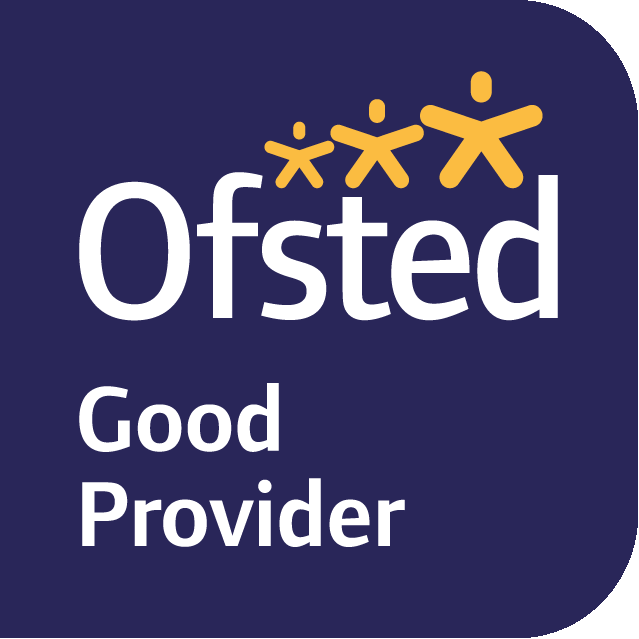KS3 Assessment (DOOYA)
Key Stage 3 (KS3) assessments at Bristol Brunel Academy serve as an important tool to evaluate students’ progress in Years 7 to 9. The purpose of these assessments is to gauge students’ understanding and skills across all subjects in the curriculum. By providing a structured measure of student learning, our KS3 assessments help teachers identify strengths and areas for improvement, inform tailored support, and ensure that students are well-prepared for the challenges of Key Stage 4 (KS4) and their eventual GCSE exams. The assessments also allow us to monitor and enhance the effectiveness of our teaching approaches, fostering an environment where each student can progress to their full potential.
Assessment Policy
At KS3 we use a mixture of formative (low stakes, informal) and summative (high stakes, formal e.g. tests) assessment to gauge student performance. We do this to give students the best opportunity to show off their knowledge and skills as well as to understand what students know and what they don’t.
Students complete formative assessment within subjects on a term by term and topic by topic basis. For example, in geography, term 1, students are prompted with a photo of the Cotswolds to answer the question ‘Do you agree this picture (an image of the Cotswolds) shows what the United Kingdom is really like’. Students are allowed to use their books and are encouraged to use a wide range of knowledge from the unit of work. Teachers then provide feedback on this work.
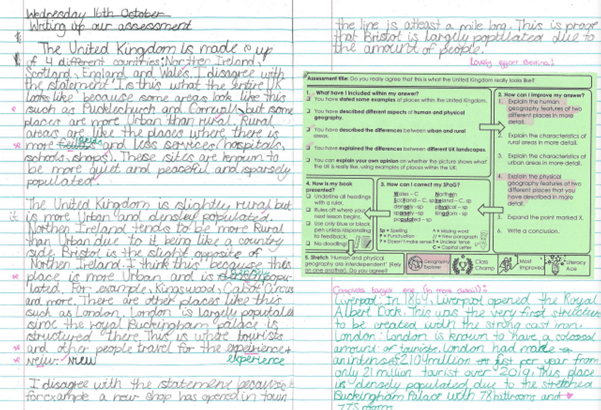
In addition, students complete summative assessments or ‘tests’ at 2 points across the school year; Assessment Point 1 and Assessment Point 2. See the graphic below. These assessments are ‘closed book’ and require students to ‘know’ and ‘remember’ the content which they have covered in class.
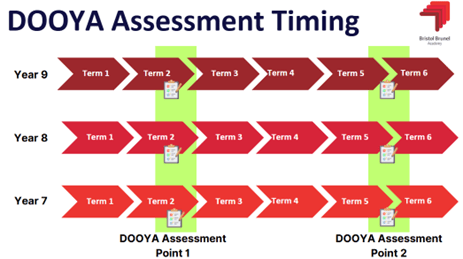
DOOYA
At Key Stage 3 we use age-related expectations to create a holistic judgement of student performance. This judgement is created by using a combination of summative (work created in class.
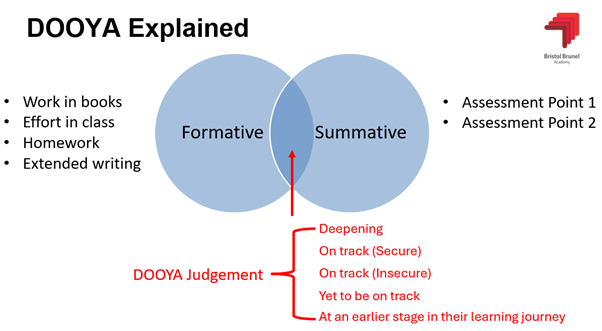
During years 7 – 9 students are awarded a grade based upon the progress expected of them at this time of their schooling. DOOYA is an acronym for this judgement. The letters that they could be awarded for each subject are outlined below.
Deepening – The student has reached the expectations for their age and is developing a further understanding of the topic.
On track (Secure) – The student has securely reached the age-related expectations
On track (Insecure) – The student has just reached the age-related expectations, but it is not yet fully secure.
Yet to be on track – The student is yet to fully achieve the expectations for their age but is likely to soon.
At an earlier stage in their learning journey – The student is working below the expectations for their age.
X (Insufficient Data) – Unable to grade due to a lack of evidence to support the teacher’s judgement.
KS3 Assessment Journey
To support students to perform at their best, we have created an assessment journey. Our hope is to enable every student to develop the skills required to revise independently; organisation, reflection, revision, memory and the ability to tackle exam style questions. We believe that with the right support at key stage 3, students should be able to develop an increasing amount of independence. With consistent practice students should enter their exam years in Key Stage 4 with a solid foundation in study skills.
Below is an outline of the KS3 Assessment Journey at Bristol Brunel Academy. We have designed these resources so they can be used and interpreted by students and parents. Therefore, we actively encourage parents to get involved in the assessment journey and to support their child through what can be a potentially stressful time.
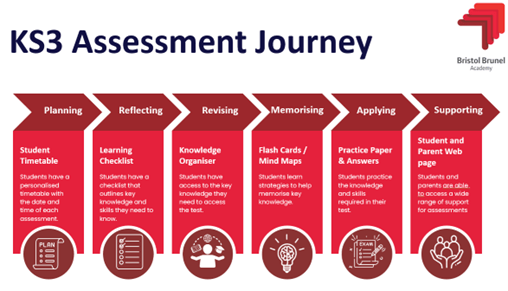
Student Timetable
All students are provided with a student timetable. This outlines the dates and times they will be completing their assessment for each subject. The purpose of this is to allow students ample time to prepare and revise for each subject. In addition, the assessment dates and times will be put on Show My Homework, our online homework application.
Learning Checklist
Learning Checklists are provided for each subject. These apply specifically to each assessment point and detail the knowledge and skills that students need to succeed in the assessment. These learning checklists feed directly into the knowledge organisers that students have and prompt them with how and what they should be thinking.
Knowledge Organiser
Our Knowledge Organisers have been constructed by our subject specialists and set out the key knowledge that students need to know. These are broken down into the key words and concepts that students will need to know to answer questions found in their DOOYA Assessment Points.
Flash Cards / Mind Maps
Each subject has kindly put together resources to help our students memorise and remember the knowledge found in the knowledge organisers. The ability to recall key knowledge found on their knowledge organiser will be strengthened when students commit the time to recalling information; repetition and in making sense of it in different ways.
Flash cards help by asking questions that students can link key knowledge to.
Mind maps help by developing students’ appreciation for the links and associations that hold together key knowledge.
Depending on preference, students may get on better with one revision strategy over another. We actively encourage students to practice and get to grips with both strategies. In addition, subject teachers may steer students towards one specific strategy, depending on how useful this strategy is for the subject.
Practice Papers
To bridge the gap between knowledge and assessment, our subject leaders have created a slimmed down set of questions that will prepare students to think in the same way of their subject assessments. These include some of the question types and skills so that students can practice applying their knowledge. Students are also given an answer sheet so they can self-mark and see how to get full marks on their assessment.

